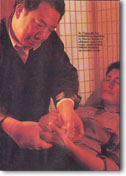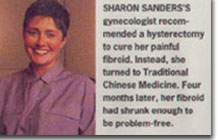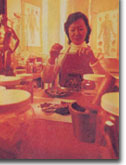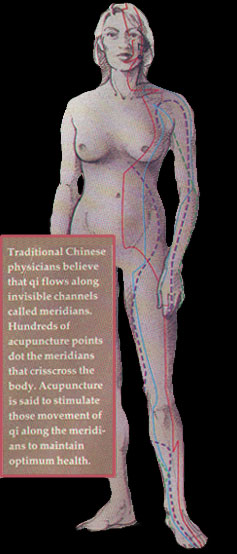"Discover the
HEALING POWER
of Chinese Medicine,"
Prevention,
pps. 104-111, March 1999
 "A few
years ago, Sharon Sanders, a 48 year old writer and cookbook author from Center
Valley, PA, had a bout of unusual abdominal pain that sent her running to her
family doctor, and eventually to the ER. 'It turned out that a fibroid
about the six of a 16-week pregnancy was growing outside my uterus,' says
Sanders. Her gynecologist recommended a hysterectomy. But Sanders
didn't want surgery--especially when it might plunge her into early menopause.
So when she saw a magazine article about Traditional Chinese Medicine (TCM) as
a possible natural fibroid-buster, she decided to try it. "A few
years ago, Sharon Sanders, a 48 year old writer and cookbook author from Center
Valley, PA, had a bout of unusual abdominal pain that sent her running to her
family doctor, and eventually to the ER. 'It turned out that a fibroid
about the six of a 16-week pregnancy was growing outside my uterus,' says
Sanders. Her gynecologist recommended a hysterectomy. But Sanders
didn't want surgery--especially when it might plunge her into early menopause.
So when she saw a magazine article about Traditional Chinese Medicine (TCM) as
a possible natural fibroid-buster, she decided to try it.
Within four months of acupuncture and herbal
treatments, her fibroid had shrunk by a third--enough to quell her symptoms and
eliminate the need for surgery. As far as Sanders is concerned, her
experience with TCM was a good one. So good, in fact, that she returned
her practitioner for more herbs and acupuncture--this time, for her allergies.
Chinese medicine may sound might strange. But
this ancient healing art, which predates our won medical system by more than
2,00 years, has drawn the attention of western researchers who are finding some
Chinese therapies surprisingly effective, especially for women. From
fibroids to hot flashes to even more serious illnesses, there's evidence that
Chinese medicine may have something to offer that you can't get elsewhere.
Treating the Whole
Person
The philosophy of TCM may take
some time for the average person to understand, but the theory behind it
is pretty simple--and appealing. Unlike conventional medicine, which
treats the outward signs of a disease or disorder, TCM practitioners believe
symptoms are the result of un underlying imbalance--and that is what they
attempt to fix.
Like
holistic physicians, TCM practitioners help you tackle lifestyle issues,
especially stress and diet, that can contribute to your physical problems.
A TCM doctor won't just treat you for hot
flashes or painful periods. He will look at what's going on in your whole
life to help determine what treatment to recommend--and what changes you
can make that will help relieve your symptoms.
'In fact,' says Terry Courtney, a license
acupuncturist and chair of the acupuncture and Oriental medicine department at
Bastyr University in Bothell, WA, 'there's a chance you could emerge from
treatment feeling like a whole new woman.'
Where Do I Sign Up?
Sound good? There is a rub: Though you can take ginseng
for energy and see an acupuncturist for you arthritis, TCM isn't really a do-it
-yourself project. To get its full health benefits, you need a
practitioner to diagnose and treat you. And unless you live in or
around a well-populated area, finding one might be tough. In 1995, there
were about 12,000 practitioners in the US. By the turn of the century,
there may be as many as 20,000. Many of them are Chinese, and in some
cases, there may be a slight language barrier.
But, if TCM's focus on individual holistic treatments, natural therapies, and exercise intrigues you, read on. You can get
referrals to certified practitioners from several sources.
natural therapies, and exercise intrigues you, read on. You can get
referrals to certified practitioners from several sources.
But don't fire your doctor. 'Think of TCM
as a supplement to the regular care you get form your doctor,' says
Courtney. Unless they are also qualified MDs--and there are some--TCM
healers don't perform the pelvic exams, Pap tests, breast exams, mammograms, or
other screenings you need.
Here's What to
Expect
In general, on your first visit, expect to be closely questioned about your
health history. Depending on your problem, it's likely you'll receive an
acupuncture treatment and perhaps some Chinese herbs your practitioners
believes will help your specific imbalance. You'll also be given dietary
suggestions, and maybe some advice about meditations or practicing tai chi or
qi gong.
Day Sweats, Night
Sweats...No Sweat
Linder Singer, 48, came to Bastyr University's Oriental Medicine Clinic hoping
to ease the monsoon-style menopausal sweats that were making her life
miserable. 'Her doctor had taken her off hormone replacement therapy
[HRT] because she had a strong family history of cancer,' recalls
Courtney. 'She was a mess--the night sweats ruined her sleep, so she was
exhausted all day, and the embarrassment of drenching herself at work made her
really anxious.'
Courtney saw Singer's problem as a classic imbalance
between yin and yang. According to ancient Chinese science, yin and yang
are the two opposing life forces. You need both, but they need to be in
balance. Too much of one, not enough of the other, and you're headed for
trouble.
Mainstream doctors believe that hormonal swings at
menopause tamper with your body's thermostat, causing hot flashes and night
sweats. But TCM practitioners have a different theory.
'Many menopausal symptoms are thought to be yin deficiencies.
Yin is associated with coolness and moisture; its opposite element, yang, is
associated with heat and dryness,' explains Courtney.
Like other TCM practitioners, Courtney believes that
as your body ages, its ability to produce yin energy diminishes. The yin
depletion that results creates a sense of heat--a sort of "false
fever." The treatment goal: to build and strengthen the yin energy
to ease the menopausal symptoms.
Singer received five weeks of acupuncture treatments
and took a Chinese herbal formula designed to correct her yin-yang
imbalance. 'By building and strengthening her body's yin and yang,
Linda's night and day sweats began to subside,' recalls Courtney. Singer
was happy to report that her sleep improved and her overall energy was much
higher.
'Though she discontinue the acupuncture after five
weeks, she continued with several more weeks of herbal treatments to maintain
her progress,' says Courtney. 'When Linda's under a lot of stress, she'll
return for acupuncture to head off any recurrences.'
"My Fibroid
Shrank and I No Longer Need a Hysterectomy."
When Sanders decided to use TCM to shrink her fibroid, she visited Chung-Hu
Tao, OMD, a TCM practitioner and licensed acupuncturist in Allentown, PA.
He prescribed weekly acupuncture treatments and a custom-blended herbal
formula.
'Dr. Tao mixed about 20 exotic herbs--dried twigs,
roots, and leaves--into paper bags. I was to boil a tea and drink a quart
of it every day. It tasted so terrible my daughters called it my 'evil
brew,'' says Sanders. But she stuck with Dr. Tao's program. (She
soon learned to flavor the tea with honey and lemon.)
Sanders monitored her progress to see whether the TCM was
making a difference. She had a baseline ultrasound taken by a medical
doctor at the beginning of the treatment. The fibroid measured 3.5 by 3.5
inches. Four months later, an ultrasound showed that the fibroid had
decreased in size by a third, and Sanders was no longer in pain.
How did the TCM treatments shrink Sander's
fibroid" No one's exactly sure. 'The amount of research on
acupuncture is overwhelming, and the National Institutes of Health confirms
that there's good evidence to use acupuncture for various forms of nausea and
pain, including menstrual cramps,' says Prevention advisor John Astin,
PhD, Fellow in the Complementary and Alternative Medicine Program at Stanford
University in Palo Alto, CA. 'But I haven't seen any research about the
effect on fibroids, possibly because no conclusive studies have been
published.'
What's more, it's hard to scientifically evaluate the
action to complex herbal formulas, since many different active compounds could
be involved.
And sometimes, fibroids shrink on their own, especially
during menopause. According to Prevention advisor Brian W. Walsh,
MD, director of the Menopause Clinic at Brigham and Women's Hospital in Boston,
fibroids usually occur when uterine muscle cells, genetically programmed to
grow to accommodate a fetus, start growing when there is no pregnancy.
'They become the clusters we call fibroids,' he explains.
But Chinese practitioners have an entirely different
take on the subject. 'In Chinese medicine, we believe that fibroids are
caused by 'stuck blood,' so we use treatments to get the blood and energy
moving again,' says Martha Benedict, OMD, a licensed acupuncturist and doctor
of Oriental medicine from Santa Cruz, CA.
And that's precisely what Dr. Tao's plan was designed
to do. He says the formula he created for Sanders included herbs that,
according to Chinese medical tradition, boosted her circulation, softened the
fibroid, and helped balance her hormones. During Sander's initial
acupuncture treatments, Dr. Tao applied the needles directly into her abdomen
over the fibroid's location to remove "blockages of energy flow."
No matter how it worked, it did work.
Sanders has now been symptom-free for more than a year.
Your Sex Life and
TCM
Picture this: A 50-something couple walks into their local acupuncturist's
office. He's got a shoulder injury, she's having headaches. The
doctor says she can help them both.
After several weeks of acupuncture and herbal
treatment, the couple report something unusual: Not only have their original
complaints subsided, their sex life has improved too. Is this some kind
of weird fluke?
Not at all, says Felice Dunas, PhD, a clinical Chinese
medical practitioner from Topan, CA, and author of Passion Play
(Riverhead Books, New York, 1998). Dr. Dunas became interested in the
connection between sex and TCM when she observed that many of the people she'd
treated over the last 25 years for unrelated problems often told her they ever
had before. It seems that as their physical conditions improved, their
relationship grew stronger, their emotions were more stable, conflicts
diminished, and habitual problems were seen in a whole new light--not to
mention their sex lives perked up.
'Chinese medicine is brilliant in its ability to
improve your general health...and that can have a positive impact on your sex
life,' says Dr. Dunas. According to her patients, 'those who said they
felt nothing sexually begin to feel alive once more.' What's more, the
benefits of good sex extend way beyond the bedroom, says Dr. Dunas. Let's
take that 50-something couple, for example. What has the improvement in
their sex life meant to them?
'It's given them a sense of spirituality, peace, and
compatibility,' says Dr. Dunas. 'Now, they have new goals and the desire
to create something new together.'"
|

![]()

 "A few
years ago, Sharon Sanders, a 48 year old writer and cookbook author from Center
Valley, PA, had a bout of unusual abdominal pain that sent her running to her
family doctor, and eventually to the ER. 'It turned out that a fibroid
about the six of a 16-week pregnancy was growing outside my uterus,' says
Sanders. Her gynecologist recommended a hysterectomy. But Sanders
didn't want surgery--especially when it might plunge her into early menopause.
So when she saw a magazine article about Traditional Chinese Medicine (TCM) as
a possible natural fibroid-buster, she decided to try it.
"A few
years ago, Sharon Sanders, a 48 year old writer and cookbook author from Center
Valley, PA, had a bout of unusual abdominal pain that sent her running to her
family doctor, and eventually to the ER. 'It turned out that a fibroid
about the six of a 16-week pregnancy was growing outside my uterus,' says
Sanders. Her gynecologist recommended a hysterectomy. But Sanders
didn't want surgery--especially when it might plunge her into early menopause.
So when she saw a magazine article about Traditional Chinese Medicine (TCM) as
a possible natural fibroid-buster, she decided to try it. natural therapies, and exercise intrigues you, read on. You can get
referrals to certified practitioners from several sources.
natural therapies, and exercise intrigues you, read on. You can get
referrals to certified practitioners from several sources.